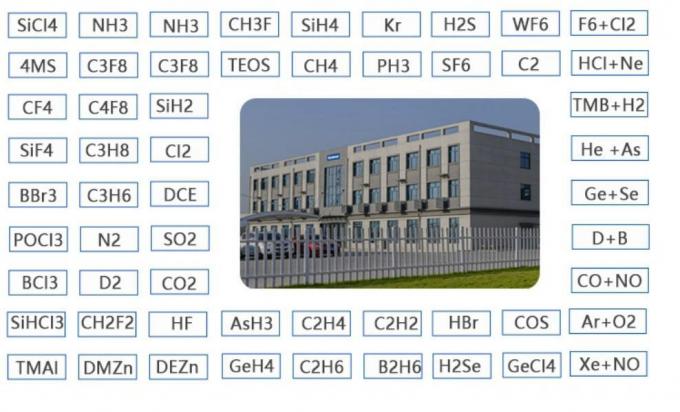


| MOQ: | 1kg |
| Price: | US $ 1/kg |
| Standard Packaging: | Cylinder |
| Delivery Period: | 15 days |
| Payment Method: | L/C, T/T |
| Supply Capacity: | 20000 Tons/Year |
Ammonia gas (NH3) is a pungent, colorless gas composed of one nitrogen atom bonded to three hydrogen atoms. It has a distinct odor and is commonly used in various industrial and agricultural applications. Here are some key points about ammonia gas:
Chemical Composition: Ammonia is composed of one nitrogen atom bonded to three hydrogen atoms (NH3).
Properties: Ammonia possesses several important properties:
Pungent Odor: Ammonia has a strong, pungent odor that is easily detectable even at low concentrations. It is often described as having a sharp, suffocating smell.
Solubility: Ammonia is highly soluble in water, forming ammonium hydroxide (NH4OH), which is an alkaline solution.
Basicity: Ammonia is a weak base and can react with acids to form ammonium salts.
Volatility: Ammonia has a relatively high vapor pressure at room temperature, which means it readily evaporates into the air.
Production: Ammonia is primarily produced through the Haber-Bosch process, a catalytic reaction that combines nitrogen gas (N2) and hydrogen gas (H2) under high pressure and temperature in the presence of a catalyst. This process allows for the large-scale production of ammonia for various applications.
Uses: Ammonia gas has several important applications:
Fertilizer Production: Ammonia is a key component in the production of nitrogen-based fertilizers. It provides a vital source of nitrogen for plant growth.
Refrigeration and Air Conditioning: Ammonia is used as a refrigerant in industrial refrigeration systems and large-scale air conditioning systems. It has excellent heat transfer properties and is environmentally friendly compared to certain synthetic refrigerants.
Cleaning and Detergents: Ammonia-based solutions are used in household and industrial cleaning products due to their ability to dissolve grease, oils, and other contaminants.
Pharmaceuticals: Ammonia is used in the manufacture of pharmaceutical products, including antibiotics and other medications.
Water Treatment: Ammonia is employed in water treatment processes to remove impurities and control pH levels.
Textile and Paper Industries: Ammonia is used in various stages of textile and paper production, including as a dye fixative and in the delignification process.
Explosives and Chemical Synthesis: Ammonia serves as a precursor in the production of various chemicals, including explosives, plastics, and synthetic fibers.
Safety Considerations: Ammonia gas is highly toxic and can cause severe irritation and damage to the respiratory system, eyes, and skin. It is essential to handle and store ammonia with appropriate precautions, such as ensuring proper ventilation, using personal protective equipment, and following established safety protocols.
It's worth noting that while ammonia has numerous industrial applications, its handling requires caution due to its toxic nature and potential hazards.
Basic Info.
| Product Name | Ammonia |
| Chemical Formula | NH3 |
| Hazard Class | 2.3 |
| Molecular Weight | 17.031 |
| UN | 1005 |
| Boiling Point(ºC) | -33.43 |
| Boiling Point(ºF) | -241.17 |
| Density(kg/m³) | 0.728 |
| Density(lb/ft³) | 0.044 |
| rocess: |
| Industrial ammonia is purified by a filter into the electronic grade ultra-high purity ammonia. The annual output of ultra-high purity ammonia gas in Jinhong is more than 10,000 tons. |
| Specification: |
| S-cylinder: 44L/47L Valve: CGA660 Content: 21Kg Y-cylinder: 440L Valve: DISS720 Content: 230Kg T-cylinder: 930L Valve: DISS720 Content:480Kg ISO tank : 22.5Nm3 Valve:1""VCR" Content:11.2T |
| Application: |
| Ammonia(NH3)is used in |
| 1. metal treating operations as nitriding, carbo-nitriding, bright annealing, furnace brazing, sintering, sodium hydride descaling, atomic hydrogen welding, and other applications where protective atmospheres are required |
| 2. hydrogenation of fats and oils as a convenient source of hydrogen |
| 3.manufacturing of alkalis, ammonium salts, dyes, pharmaceuticals, cuprammonium rayon, and nylon |
| 4. rubber industry for stabilization of raw latex to prevent coagulation during transportation and torage |
| 5. as a catalyst in the phenol-formaldehyde condensation and also in the urea-formaldehyde condensation to make synthetic resin |
| 6.produce proteins and can be used to improve the protein content of low quality hay |
| 7.semiconductor industry |
| 8.production of blue and white LEDs (Light Emitting Diods) |
| 9.In the field of novel optoelectronic materials, it is an important base material for GAN preparation by MOCVD technology. High purity ammonia or the preparation of nitrogen trifluoride, silicon nitride, the basic material, is the production of super high nitrogen raw gas. In addition, liquid ammonia is widely used in the semiconductor industry, the metallurgical industry, as well as other industries and scientific research that need to protect the atmosphere. |
Emergency Measures:


ShangHai CMC chemical Co.,ltd. is staffed by trained personnel, combine many years experience in Gas industry .We supply cylinder gas, electronic gas, etc ., and the gas holder, panel, valves and fittings and other equipment, parts and engineering services to our customers in China and worldwide; The products are involved in various industrial fields, such as semiconductor chip, solar cell, LED, TFT-LCD, optical fiber, glass, laser, medicine , etc., Our mission is to partner with our global customers to provide support, solutions and quality products that are innovative,reliable, and safe.
Our products mainly include: H2, O2, N2, Ar, CO2, propane, acetylene, helium, laser mixed gas, SiH4, Sih2cl2, SiHCL3, SiCL4, NH3, CF4, NF3, SF6, HCL, N2O, doping mixed gas (TMB, PH3, B2H6) and other electronic gases.







| MOQ: | 1kg |
| Price: | US $ 1/kg |
| Standard Packaging: | Cylinder |
| Delivery Period: | 15 days |
| Payment Method: | L/C, T/T |
| Supply Capacity: | 20000 Tons/Year |
Ammonia gas (NH3) is a pungent, colorless gas composed of one nitrogen atom bonded to three hydrogen atoms. It has a distinct odor and is commonly used in various industrial and agricultural applications. Here are some key points about ammonia gas:
Chemical Composition: Ammonia is composed of one nitrogen atom bonded to three hydrogen atoms (NH3).
Properties: Ammonia possesses several important properties:
Pungent Odor: Ammonia has a strong, pungent odor that is easily detectable even at low concentrations. It is often described as having a sharp, suffocating smell.
Solubility: Ammonia is highly soluble in water, forming ammonium hydroxide (NH4OH), which is an alkaline solution.
Basicity: Ammonia is a weak base and can react with acids to form ammonium salts.
Volatility: Ammonia has a relatively high vapor pressure at room temperature, which means it readily evaporates into the air.
Production: Ammonia is primarily produced through the Haber-Bosch process, a catalytic reaction that combines nitrogen gas (N2) and hydrogen gas (H2) under high pressure and temperature in the presence of a catalyst. This process allows for the large-scale production of ammonia for various applications.
Uses: Ammonia gas has several important applications:
Fertilizer Production: Ammonia is a key component in the production of nitrogen-based fertilizers. It provides a vital source of nitrogen for plant growth.
Refrigeration and Air Conditioning: Ammonia is used as a refrigerant in industrial refrigeration systems and large-scale air conditioning systems. It has excellent heat transfer properties and is environmentally friendly compared to certain synthetic refrigerants.
Cleaning and Detergents: Ammonia-based solutions are used in household and industrial cleaning products due to their ability to dissolve grease, oils, and other contaminants.
Pharmaceuticals: Ammonia is used in the manufacture of pharmaceutical products, including antibiotics and other medications.
Water Treatment: Ammonia is employed in water treatment processes to remove impurities and control pH levels.
Textile and Paper Industries: Ammonia is used in various stages of textile and paper production, including as a dye fixative and in the delignification process.
Explosives and Chemical Synthesis: Ammonia serves as a precursor in the production of various chemicals, including explosives, plastics, and synthetic fibers.
Safety Considerations: Ammonia gas is highly toxic and can cause severe irritation and damage to the respiratory system, eyes, and skin. It is essential to handle and store ammonia with appropriate precautions, such as ensuring proper ventilation, using personal protective equipment, and following established safety protocols.
It's worth noting that while ammonia has numerous industrial applications, its handling requires caution due to its toxic nature and potential hazards.
Basic Info.
| Product Name | Ammonia |
| Chemical Formula | NH3 |
| Hazard Class | 2.3 |
| Molecular Weight | 17.031 |
| UN | 1005 |
| Boiling Point(ºC) | -33.43 |
| Boiling Point(ºF) | -241.17 |
| Density(kg/m³) | 0.728 |
| Density(lb/ft³) | 0.044 |
| rocess: |
| Industrial ammonia is purified by a filter into the electronic grade ultra-high purity ammonia. The annual output of ultra-high purity ammonia gas in Jinhong is more than 10,000 tons. |
| Specification: |
| S-cylinder: 44L/47L Valve: CGA660 Content: 21Kg Y-cylinder: 440L Valve: DISS720 Content: 230Kg T-cylinder: 930L Valve: DISS720 Content:480Kg ISO tank : 22.5Nm3 Valve:1""VCR" Content:11.2T |
| Application: |
| Ammonia(NH3)is used in |
| 1. metal treating operations as nitriding, carbo-nitriding, bright annealing, furnace brazing, sintering, sodium hydride descaling, atomic hydrogen welding, and other applications where protective atmospheres are required |
| 2. hydrogenation of fats and oils as a convenient source of hydrogen |
| 3.manufacturing of alkalis, ammonium salts, dyes, pharmaceuticals, cuprammonium rayon, and nylon |
| 4. rubber industry for stabilization of raw latex to prevent coagulation during transportation and torage |
| 5. as a catalyst in the phenol-formaldehyde condensation and also in the urea-formaldehyde condensation to make synthetic resin |
| 6.produce proteins and can be used to improve the protein content of low quality hay |
| 7.semiconductor industry |
| 8.production of blue and white LEDs (Light Emitting Diods) |
| 9.In the field of novel optoelectronic materials, it is an important base material for GAN preparation by MOCVD technology. High purity ammonia or the preparation of nitrogen trifluoride, silicon nitride, the basic material, is the production of super high nitrogen raw gas. In addition, liquid ammonia is widely used in the semiconductor industry, the metallurgical industry, as well as other industries and scientific research that need to protect the atmosphere. |
Emergency Measures:


ShangHai CMC chemical Co.,ltd. is staffed by trained personnel, combine many years experience in Gas industry .We supply cylinder gas, electronic gas, etc ., and the gas holder, panel, valves and fittings and other equipment, parts and engineering services to our customers in China and worldwide; The products are involved in various industrial fields, such as semiconductor chip, solar cell, LED, TFT-LCD, optical fiber, glass, laser, medicine , etc., Our mission is to partner with our global customers to provide support, solutions and quality products that are innovative,reliable, and safe.
Our products mainly include: H2, O2, N2, Ar, CO2, propane, acetylene, helium, laser mixed gas, SiH4, Sih2cl2, SiHCL3, SiCL4, NH3, CF4, NF3, SF6, HCL, N2O, doping mixed gas (TMB, PH3, B2H6) and other electronic gases.





